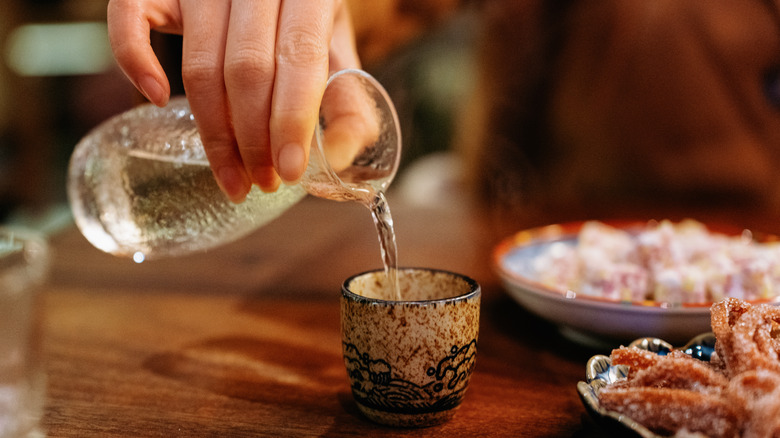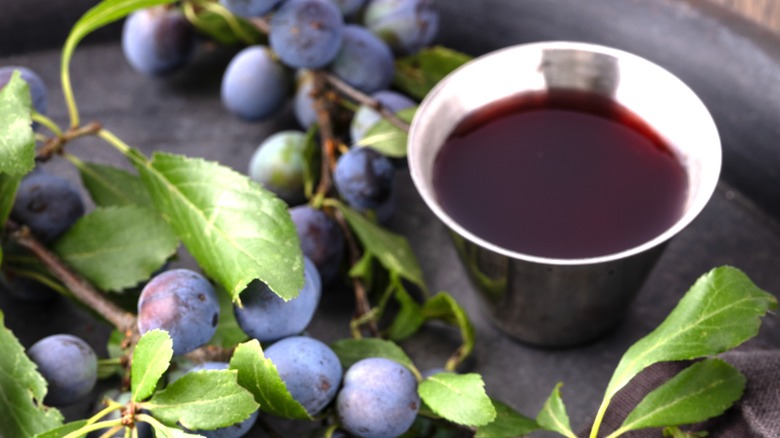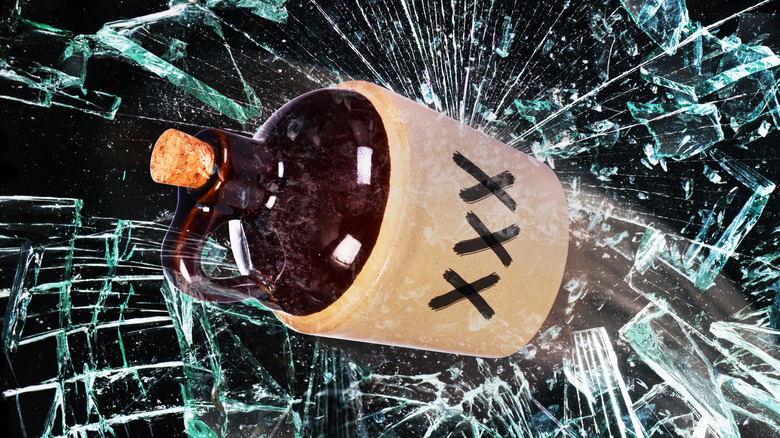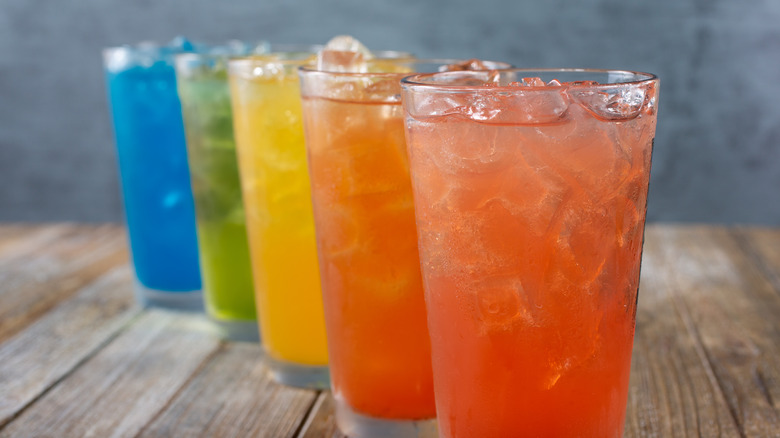7 Types Of Liquor To Never Use In Warm Winter Drinks
Love it or hate it, winter is on its way. While a comforting cup of cocoa, homemade apple cider, or hot tea is a great way to ease the chill during the day, by night, you can't beat the coziness of a warm cocktail. Aside from the pleasing temperature, warm alcoholic drinks (especially hot toddies) have long been touted as solid head cold fighters – though the verdict on this is still disputed. Of course, assembling a warm winter drink may seem foolproof: Take the warm beverage of your choice and add whatever alcohol you have on hand. However, there are some liquors best left cold.
While most spirits pair easily with a number of hot drinks, we consulted several top experts in the beverage industry to learn which liquors should never be used in warm cocktails. Whether you choose to use caffeinated drinks (or their decaf counterparts) or experiment with the ever-expanding range of herbal teas, here are seven liquors you should avoid using when you want a boozy hug in a mug.
Gin
Gin and tonic is a classic cocktail for a reason. The light, refreshing taste of the gin works best when those elements are well-balanced by enhancing the refreshing flavors in a cold cocktail. However, the warmth of a hot soft drink ups the liquor's flavor potency (not in a good way) and disturbs the delicate balance of the melange of botanicals found in each bottle. After all, when you warm up gin, oxidation may occur and potentially destroy the flavor.
Christopher Hickey, a cocktail artisan with 20 years of experience behind the bar and owner of Draughtwood Mobile bars in Piermont, New York, explains, "Gin's unique botanical complexity can become overwhelming in hot drinks. Plus, hot temperatures can lower alcohol's potency, meaning gin's aromatic elements and ABV don't shine in heated cocktails." With that in mind, even if you're tempted to add a splash of gin to your nightly cup of tea, it's better to opt for another spirit instead.
Tequila
Many of us are familiar with the "one tequila, two tequila, three tequila, floor" quote made famous by George Carlin. The late comedian's wise words can also apply if you have the urge to heat your tequila, as doing so may make you feel a little unwell just from one sip.
The best way to enjoy tequila is lightly chilled or at room temperature. This is because when you heat tequila, you reduce the potency, and disrupt the integrity of the flavor. Also, it's just gross, as Christopher Hickey points out: "A hot shot of tequila? That one's enough to give anyone goosebumps!"
Wael Deek, bar manager and director of experience at two New York City hotspots – Alice Restaurant and Osteria57 – agrees with Hickey. Additionally, Deek noted tequila is "a spirit born of sunshine and agave, loses its vibrant character in the heat. The delicate dance of earthy and sweet notes becomes muddled, leaving behind a fiery, almost bitter taste that clashes with the warmth of the drink."
Vodka
Whether you prefer a martini made with gin or vodka, neither spirit is a good match for the heft of a warm drink. In fact, you might be left with too much heat — and find yourself experiencing an unpleasant burn with each sip. Like the other liquor varieties mentioned, you'll also alter the strength of the alcohol by volume of the vodka while adding unwelcome flavors.
To be frank, the only time you should be heating vodka is if you're making classic penne alla vodka sauce. Otherwise, this clear cocktail ingredient best belongs on ice. As Christopher Hickey told Tasting Table, "Vodka has a low boiling point and evaporates quickly when exposed to heat, so you lose both flavor and potency in hot drinks. Heated vodka can also leave a harsh, burning sensation, which isn't the smooth experience most people look for in a warm cocktail."
Will Rivas, beverage director at Rafael Restaurant in New York City, agrees with the sentiment regarding vodka, stating it's "best kept to the icy realm of cocktails. Heat tends to amplify its flavor, turning a subtle neutrality into a medicinal harshness that overpowers the senses."
Sake
This may be a surprising addition to the list. After all, who among us hasn't tried hot sake after a night of dining on delicious sushi? However, according to Bernadette James, sommelier at Stages at One Washington and The Living Room in Dover, New Hampshire, there's more to consider when it comes to the optimal temperature to serve sake.
"The only liquor I would never use in a hot drink is sake," James told us. "When a sake is served warm or hot, that is because the sake is probably not the best quality, and the temperature will mask its imperfections. A good quality sake is served chilled so all of its subtle and unique flavors can be tasted, so to serve it hot means you'd be missing out on all the delicious flavors of the liquor." Though this revelation may be shocking, it's far less so if you think about what Japan's national drink would taste like swimming in bitter black coffee, or drowning in cocoa creaminess.
On second thought, this advice was really hiding in plain sight. After all, sake's mildly sweet flavors are the hallmark of the prized rice wine, so it's best to sip and savor slowly (never drink it like a shot) — and only after it's been properly chilled. Like vodka, if you really can't resist heating up this drink, you can use it to steam rice or fish, or use it as a marinade.
High sugar liqueurs
Triple sec is phenomenal in a margarita, but not so much in a warm boozy beverage. Other high sugar liqueurs, like sloe gin (which is gin infused with sweet sloe berries), may also provide coziness because of nostalgia. But the saccharine, syrupy taste is best used sparingly in a frosty cold drink, and isn't recommended as a hot drink accouterment.
Cocktail artisan Christopher Hickey explains that "liqueurs with high sugar content are also tricky in hot drinks, as they can burn or even curdle when exposed to heat. This reaction can create an unpleasant texture that's not appealing in a cocktail."
Curdling liquor is as good a reason as any to avoid liquors with a high sugar content in your winter drinks, of course. But another, less obvious reason is to avoid overindulging on unhealthy beverages, especially during the holiday season. Skip drinking your calories, then, and go for your favorite relative or friend's homemade holiday cookies instead.
High proof liquors
It may be tempting to choose a high proof liquor for a warm drink this winter, especially if you're battling a cold and trying to scare it away (so to speak). But just don't do it. It's so much better to resist the temptation. After all, grabbing a high proof vodka, moonshine, or even the highly egregious Everclear will only make your cocktail unpalatable — and is apt to make your body feel awful the next day if you're already ailing.
Cody Fredrickson, mixologist and tour manager from Las Vegas Distillery, explains why he would avoid high proof liquors in warm cocktails. "I would stay away from high proof alcohol because the heat will highlight the alcohol content more than the subtle flavors."
The sheer thought of drinking a hot cup of Everclear would make the hairs on the back of anyone's neck stand up. So keep this in mind if you're tempted to throw caution to the wind on cold days and ignore the warm drink advice from experts.
Artificially flavored liquors
It should come as no surprise that the last entry on our list of alcohols to avoid in warm cocktails is artificially flavored liquors. Aside from the potential health impacts of a chemically constructed cocktail, the flavoring promised almost never delivers on your palette. In fact, Cody Fredrickson's advice is to avoid fake flavors, stating, "I would also stay away from anything artificially sweetened or flavored, as that 'chemical' taste will be showcased."
Consequently, you should ditch Fireball cinnamon whisky or sour apple schnapps with your warm cocktail, and opt for real ingredients instead. Real apple cider mixed with a splash of whiskey, and garnished with a cinnamon stick, is a fan favorite for good reason.
Additionally, flavored vodkas are also a no-no, given the amplified chemical taste you'll no doubt experience. Anything dyed a color not typically found in nature (besides a rainbow) should be avoided, as well, and products like Hpnotiq should always stay chilled. As far as what Fredrickson would advise you to use in your warm alcoholic drinks this winter, he told us he enjoys "bourbon, rum, and brandy in hot cocktails."







